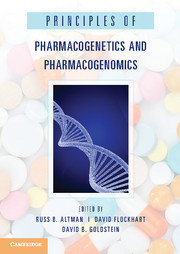Introduction
Published online by Cambridge University Press: 05 June 2012
Summary
Health care is moving toward a more individualized approach that has been termed “personalized medicine.” The underlying causes for this transition are many; they include the ability to genotype and sequence DNA, the increasing emphasis on consumerism among patients, and changes in the pharmaceutical industry worldwide and particularly at the U.S. Food and Drug Administration (FDA) and its sister regulatory agencies around the world. Pharmacogenetics and pharmacogenomics both involve the study of how genetics exerts an impact on drug response phenotype. For our purposes, the term “pharmacogenetics” connotes single genes that dominate the effects on a drug response, whereas “pharmacogenomics” connotes systems of many genes that create complex drug response phenotypes. It is clear that pharmacogenetics and pharmacogenomics are the core elements of the future of personalized medicine.
The emergence of robust and effective patient advocacy groups over the past thirty years has led to organized demands by patients for medicines that are more effective and that have fewer side effects. This was fueled by the Institute of Medicine “To Err is Human” report of 1999, which estimated that more than 50,000 Americans die each year because of medical errors, in particular, involving prescription drugs. Health care organizations have registered the clinical and financial dangers inherent in medication errors, and more precise prescribing is now a central part of quality control and even part of the marketing campaigns for hospitals in the United States. The pharmaceutical industry is experiencing the death of the “blockbuster” model of drug development in which one dose of a single medication can be used to treat everyone, including men and women, people of all races, infants, adolescents, adults, and the elderly.
- Type
- Chapter
- Information
- Principles of Pharmacogenetics and Pharmacogenomics , pp. xi - xiiPublisher: Cambridge University PressPrint publication year: 2012



